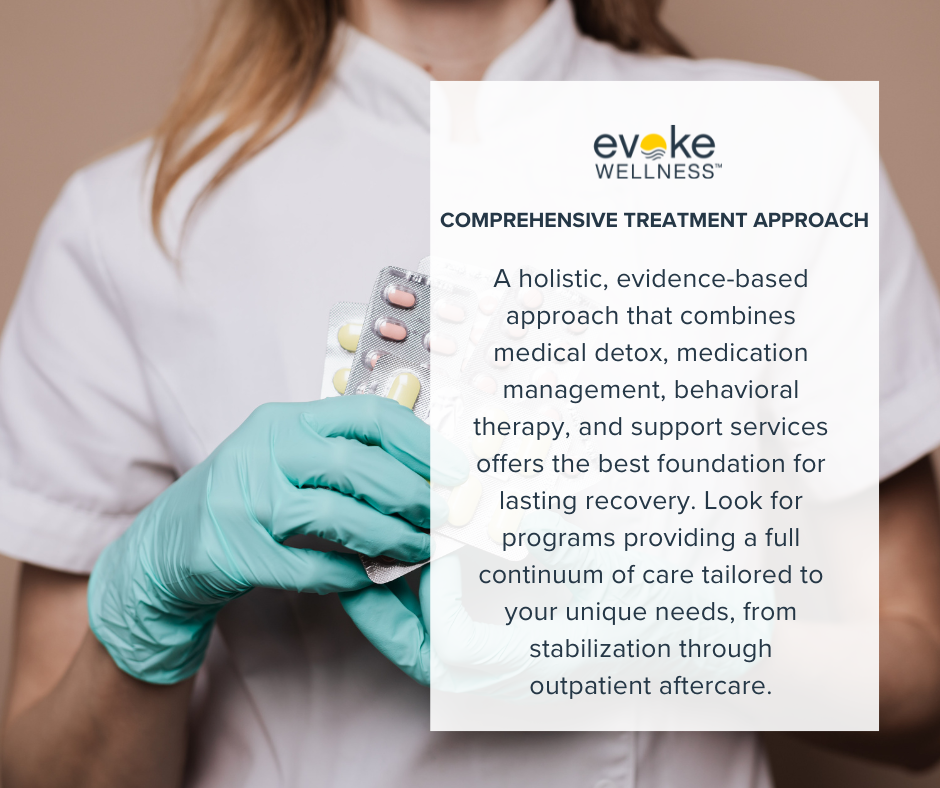As you navigate the challenging journey of overcoming substance use disorder, you may encounter various treatment options. One approach gaining recognition for its effectiveness is Medication-Assisted Treatment (MAT) in drug detox. MAT programs combine FDA-approved medications with counseling and behavioral therapies to provide a comprehensive approach to recovery. Recent studies have shown that MAT can significantly reduce the risk of relapse and overdose, with patients 50% more likely to remain in treatment compared to those not receiving medication support. By addressing both the physical and psychological aspects of addiction, MAT offers you a powerful tool in your pursuit of lasting sobriety and improved mental health.
Together, let’s embrace the journey to recovery and the promise of a new beginning. Call us at (833) 949-1347 today or reach out online.
What is Medication-Assisted Treatment (MAT)?
Definition & Overview
Medication-Assisted Treatment (MAT) is a comprehensive, evidence-based approach to treating substance use disorders. It combines FDA-approved medications with counseling and behavioral therapies to address both the physical and psychological aspects of addiction.
MAT programs aim to restore brain chemistry disrupted by substance abuse, suppress cravings and withdrawal symptoms, and provide a holistic treatment plan for lasting recovery.
How MAT Works
The medications used in MAT, such as buprenorphine (Suboxone), naltrexone (Vivitrol), and methadone, work by:
- Blocking the euphoric effects of opioids or alcohol
- Reducing intense cravings that can trigger relapse
- Easing withdrawal discomfort like nausea, muscle aches, and insomnia
This allows individuals to focus on counseling, therapies like CBT and DBT, and developing crucial coping mechanisms without being derailed by physical dependency.
Proven Benefits
Numerous studies highlight the efficacy of MAT programs. According to data, MAT can increase treatment retention rates by up to 74% and reduce relapse risk by 50% in the first year. It has also been shown to improve treatment outcomes, lower illicit opioid use, and decrease the risk of overdose compared to treatment without medication.
By stabilizing brain function and addressing the multifaceted nature of addiction, MAT sets the stage for individuals to achieve and maintain sobriety while regaining control of their lives.
The Purpose of Medication-Assisted Treatment
Addressing Substance Use Disorders
Medication-assisted treatment (MAT) is a comprehensive approach that combines the use of FDA-approved medications with counseling and behavioral therapies. Its primary purpose is to address and treat substance use disorders, particularly opioid and alcohol addictions. According to studies, MAT has been shown to significantly improve treatment outcomes, increase retention rates, and reduce the risk of overdose and relapse.
Managing Withdrawal Symptoms
One of the key roles of MAT is to help individuals manage the often severe and potentially life-threatening withdrawal symptoms associated with substance abuse. The medications used in MAT, such as methadone, buprenorphine, and naltrexone, work by restoring balance to the brain’s chemistry and reducing cravings and compulsive behaviors. This allows patients to focus on their recovery without being overwhelmed by physical and psychological withdrawal effects.
Holistic Recovery Approach
MAT is not a standalone solution but rather an integral part of a comprehensive treatment plan. By addressing both the physical and psychological aspects of addiction, MAT enhances the effectiveness of other therapies, such as cognitive-behavioral therapy (CBT), dialectical behavior therapy (DBT), and support groups. This holistic approach targets the underlying causes of substance abuse and equips individuals with the tools and support they need to achieve and maintain long-term sobriety.
Proven Effectiveness
Numerous studies have demonstrated the efficacy of MAT in treating prescription drug addiction and other substance use disorders. Research has shown that individuals who receive MAT experience reduced substance use, lower risk of overdose, and better retention in treatment compared to non-medication-assisted approaches. By combining medication with counseling and lifestyle changes, MAT provides a holistic solution that supports individuals throughout their recovery journey.
The Benefits of Medication-Assisted Treatment
Improved Treatment Retention
Medication-assisted treatment (MAT) programs significantly increase patient retention rates in comprehensive addiction treatment compared to non-medication approaches. Studies show over 60% of individuals who complete MAT-based programs remain sober after one year, versus just 25% who attempt recovery without professional support. The medications used, like Suboxone and Vivitrol, help manage cravings and ease withdrawal, making it easier for patients to fully engage in counseling and behavioral therapies.
Reduced Overdose Risk
By curbing intense cravings and restoring brain chemistry disrupted by substance abuse, MAT reduces the risks of relapse and overdose. Medications like methadone and buprenorphine block the effects of opioids, while naltrexone binds to opioid receptors to eliminate the rewarding effects of opioid use. This protective barrier against relapse is a major benefit of MAT’s whole-patient approach.
Improved Physical & Mental Health
MAT helps prevent addiction-related health issues by providing relief from intense withdrawal symptoms and drug cravings during the vulnerable detox and early recovery phases. By managing these obstacles, patients can better focus on restoring their overall wellness through counseling, nutrition support, and developing healthier coping mechanisms. The comprehensive nature of quality MAT programs like those at Evoke Wellness addresses physical dependence while nurturing mental and emotional healing.
With its proven efficacy in increasing treatment engagement, reducing health risks, and improving long-term recovery outcomes, medication-assisted treatment offers a safe, evidence-based pathway to overcoming substance use disorders and achieving lasting sobriety. When integrated into a personalized treatment plan, these FDA-approved medications provide crucial support through the detox process and beyond.
Factors to Consider When Choosing a MAT Program
Accreditations & Staff Expertise
Prioritize accredited facilities with licensed professionals experienced in addiction medicine and mental health treatment. The staff should include board-certified physicians, nurses, counselors, and therapists trained in proven techniques like cognitive behavioral therapy and motivational interviewing.
Personalized & Inclusive Care
The ideal program conducts a thorough assessment to create an individualized treatment plan addressing your specific substance use disorder, any co-occurring mental health issues, and personal circumstances. Specialized tracks tailored to gender, age, cultural background, or other factors can provide a supportive, inclusive environment.
Support Services & Aftercare
Effective MAT programs involve your family in the recovery process through education, counseling, and planning for a structured transition to outpatient care or sober living arrangements. Comprehensive aftercare, relapse prevention strategies, and community resources increase your chances of maintaining sobriety long-term.
The Role of MAT in Comprehensive Drug Detox
Integrating MAT with Medical Detox
Medication-assisted treatment (MAT) plays a crucial role in enhancing the effectiveness of medical detox programs. During this initial stage of recovery, individuals undergo the elimination of addictive substances from their bodies under 24/7 medical supervision. Detox centers utilize FDA-approved medications like methadone, buprenorphine (Suboxone), and naltrexone (Vivitrol) to help manage withdrawal symptoms and cravings. This makes the detox process safer, more comfortable, and increases the likelihood of successful completion.
Addressing Co-Occurring Mental Health Conditions
Individuals with substance use disorders often struggle with co-occurring mental health conditions like depression, anxiety, or trauma-related disorders. MAT programs are designed to address these dual diagnoses, combining medication therapies with behavioral counseling and psychotherapy. This comprehensive approach targets the physical, psychological, and emotional aspects of addiction, promoting long-term recovery.
Providing Ongoing Support and Aftercare
While detox is a crucial first step, lasting sobriety requires a continuum of care. MAT programs often extend beyond the initial detox phase, providing ongoing medication management and support to help individuals maintain abstinence and prevent relapse. This continued treatment is integrated with other evidence-based therapies, counseling, and aftercare services to reinforce the skills and strategies needed for sustainable recovery.
Studies show that MAT can increase retention in substance abuse programs by up to 74%, significantly improving long-term outcomes. By combining medication therapies with comprehensive care, individuals have a greater chance of achieving lasting sobriety and improved quality of life.
The Crucial Role of Medication-Assisted Treatment (MAT) in Drug Detox
Detoxification, or detox, is an essential first step in overcoming substance use disorders (SUDs). However, quitting “cold turkey” can be extremely dangerous, leading to severe withdrawal symptoms and potential life-threatening complications like seizures or delirium tremens. This is where medication-assisted treatment (MAT) plays a crucial role, providing a safe, controlled environment for individuals to eliminate addictive substances from their bodies.
Easing Withdrawal with FDA-Approved Medications
During medical detox, FDA-approved medications are administered under close supervision to alleviate intense withdrawal symptoms and cravings. Common MAT drugs include:
- Benzodiazepines like Librium and Valium to reduce the risk of seizures and other life-threatening symptoms.
- Opioid replacement therapies such as Suboxone (buprenorphine/naloxone) and Vivitrol (naltrexone) to manage opioid cravings and block their effects.
- Medications tailored to specific withdrawal symptoms, like anti-nausea or anti-anxiety drugs.
Studies show that MAT can increase successful recovery rates by up to 68% compared to quitting without professional help, making it a vital component of comprehensive addiction treatment programs.
Stabilizing for Long-Term Recovery
While detox alone is not enough for lasting sobriety, MAT helps stabilize individuals physically and mentally, allowing them to engage more fully in subsequent therapies and treatments. By reducing the severity of withdrawal effects, MAT increases treatment retention rates and lowers the risk of relapse, paving the way for effective counseling, behavioral therapies, and holistic care.
After completing detox, individuals typically transition into a comprehensive addiction treatment program, such as residential rehabilitation or intensive outpatient care. Here, they can continue receiving MAT support alongside evidence-based psychotherapies to address the root causes of their substance abuse and develop healthy coping strategies for long-term recovery.
Conclusion
As you consider treatment options for substance use disorders, remember that medication-assisted treatment plays a vital role in successful recovery. MAT programs, when combined with medical detox and comprehensive mental health support, offer the best chance for long-term sobriety. Recent studies show that patients in MAT programs are 50% more likely to remain in treatment and achieve sustained abstinence compared to those in non-MAT programs. By addressing both the physical and psychological aspects of addiction, MAT provides a holistic approach to healing. As you take the courageous step towards recovery, consider facilities that offer evidence-based MAT programs as part of their comprehensive treatment plans. Your journey to wellness deserves the most effective tools available in modern addiction medicine.
Begin Your Journey with Evoke Wellness at Hilliard
If you or a loved one is considering treatment, Evoke Wellness at Hilliard invites you to contact us. Our compassionate team is ready to answer your questions, discuss your needs, and help you take the first steps toward recovery. In Hilliard, you’ll find more than just a treatment program – you’ll discover a community dedicated to your wellness and success. Together, let’s embrace the journey to recovery and the promise of a new beginning. Call us at (833) 949-1347 today or reach out online.



